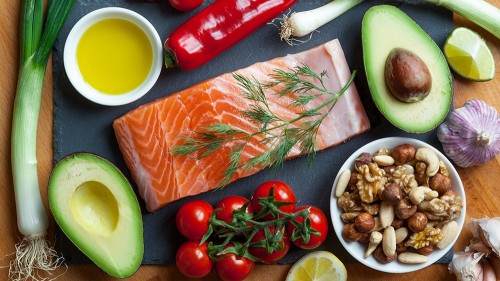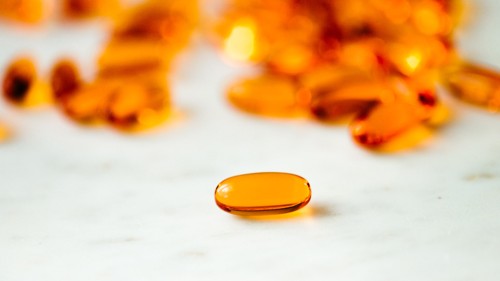9 Ways to Naturally Lower Your Cholesterol
Published on January 18, 2022
Medically Reviewed by Anthony Dugarte, MD
Simple changes in your foods and daily habits can help you naturally lower your cholesterol and overall cardiovascular disease risk.


When you think about cholesterol, the first things that probably come to mind are how to avoid it and what you can do to lower it.
After all, excessive cholesterol in our blood can lead to plaque build-up in our arteries, the development of atherosclerosis, and major cardiac events like a heart attack or stroke.
It’s essential that we keep a balance of cholesterol in our bodies. The goal is to have low total and LDL cholesterol levels (bad cholesterol) and higher HDL levels (good cholesterol). (1)
We can’t rid ourselves entirely of cholesterol because it is important for maintaining our bodies. It is essential in the make-up of cell membranes, hormone production, bile acid production for digestion, and vitamin D. (2)
We once thought that your cholesterol intake had a direct connection to cholesterol levels in the blood, but current research shows that it’s not quite that simple.
People’s responses to cholesterol from the diet vary greatly. Approximately two-thirds of the population in the U.S. has only a small response to dietary cholesterol; therefore, it may not need to be avoided.
Nutrient analysis shows that some foods high in cholesterol may also be high in saturated fat, which can increase the risk for cardiovascular disease. (3)
Even the highly debated egg may not have a significant impact on cholesterol levels and risk of getting cardiovascular disease. (4)
That being said, some people are sensitive to having dietary cholesterol and should monitor their intake, especially if they have existing cardiovascular disease.
Outside of monitoring your cholesterol intake, there are many things that you can do to lower your cholesterol and reduce your risk for cardiovascular disease.
1. Reduce Saturated and Trans Fat Intake
Lowering your saturated fat intake may be beneficial to lowering your cholesterol, especially saturated fats found in processed foods.
A 2020 review suggests that the health effects of saturated fatty acids may depend on the nutrient density of the food. (5)
Foods like whole fat dairy, unprocessed red meats, and dark chocolate do not create the same increase in cholesterol or risk of cardiovascular disease.
Foods high in saturated fats such as processed meats, fried foods, and baked goods are likely to raise LDL and cardiovascular risk.
To reduce cholesterol, The American Heart Association still recommends reducing saturated fat intake and increasing intake of healthy mono and polyunsaturated fats. (6)
Intake of trans fats has a clearer, more detrimental effect on cholesterol. Trans fats are primarily man-made fats found in fried and processed foods.
Studies consistently find that trans fatty acids and partially-hydrogenated fats promote fat storage, inflammation, and cholesterol synthesis compared to other types of fat. (7)
Put It Into Action
- Limit the use of saturated fats like butter and palm kernel oil in cooking, and switch to unsaturated plant-based oils, like olive or canola oil.
- Try a Meatless Monday or monitor your portions of foods high in saturated fat, like red meat.
- Reduce intake of calorie-dense, heavily-processed meats or snacks.
2. Increase Polyunsaturated and Monounsaturated Fats
One of the most effective ways to reduce your cholesterol levels is to prioritize using unsaturated fats in your diet.
Both polyunsaturated fats and monounsaturated fats are generally liquid at room temperature.
Examples of foods containing polyunsaturated fats include:
- fish
- walnuts
- sunflower seeds
- flaxseeds
Sources of monounsaturated fats include:
- olives
- olive oil
- nuts such as pecans and almonds
- nut butter
- peanut oil
A 2020 review on fats and cardiovascular disease prevention found that replacing saturated fats with polyunsaturated fats, especially those with omega-6 fats, may reduce total cholesterol and reduce the risk for heart attack or stroke. (8)
Monounsaturated fats are also associated with decreased LDL cholesterol, triglycerides, and cardiovascular disease risk, but the magnitude of the effect is smaller with these fats.
Put It Into Action
- Try including fatty fish into your diet twice weekly to increase your intake of polyunsaturated fats.
- Add flaxseeds and nuts to foods like granola, yogurt, or other dishes to increase monounsaturated fats.
- Choose plant-based oils, like olive oil or canola oil, when cooking.
Related: 12 Foods That Are Very High in Omega-3, According to a Dietitian
3. Increase Soluble Fiber Intake
Soluble fiber is a type of fiber that increases the amount of water in your stool, making it easier to pass through the intestines.
They also bind bile acids (made from cholesterol) in stool, making them unavailable for reabsorption in the body (9)
As a result, your liver has to create more bile acids out of the cholesterol in your body. This decreases the amount of circulating cholesterol in your blood.
A 2016 review on the effects of soluble dietary fiber on cholesterol found that soluble fiber can reduce both total cholesterol and LDL cholesterol levels by 5%–10%. (10)
Oats, apples, beans and peas, citrus fruits, berries, and psyllium powder are good sources of soluble fiber.
Put It Into Action
- Beans are a versatile food group for recipes, so prepare a bean soup, beans and rice, or another bean-centric dish.
- Oatmeal is a great dish for breakfast or a post-workout recovery meal.
- Make use of seasonal fruits and include foods like apples, citrus fruits, or berries as a snack or with meals.
Related: 10 Fiber-Rich Foods to Add to Your Diet Today, According to a Dietitian
4. Exercise Regularly
Exercise is consistently shown in studies to be beneficial for heart health, both for the prevention and treatment of cardiovascular diseases. (11)
A 2014 review examined the benefits of exercise on reducing cholesterol and improving lipid profile. (12)
Researchers found that regular, low-to-moderate intensity exercise can increase HDL cholesterol while maintaining LDL cholesterol and triglycerides. More intense exercise results in decreased LDL cholesterol and triglyceride levels.
Both aerobic exercises and weight-resistance exercises are effective in reducing cholesterol and improving blood fat levels.
To optimize your lipid levels and overall fitness, include both aerobic and weight resistance training in your exercise regimen.
Put It Into Action
- Before increasing your level of exercise, speak with your doctor first.
- Aim for about 150 minutes of moderate-intensity exercise (30 minutes, five days per week) or 75 minutes of vigorous-intensity exercise weekly.
- Include both cardio and weight-resistance exercises in your routine.
Related: How to Start Exercising: A Beginner’s Guide
5. Include Plant Sterols and Stanols
Plant sterols and stanols are compounds that are similar to cholesterol in shape. These compounds improve blood lipids by partially blocking the absorption of cholesterol in the gut.
Plant sterols and stanols can be found in various fruits, vegetables, seeds, nuts, vegetable oils, and grains.
Doses of up to 3 g of plant sterols and stanols daily are shown to be effective in reducing LDL cholesterol between 6%–12% from baseline. (13)
To achieve the most therapeutic levels of plant sterols and stanols, you typically need to find products enriched with these compounds.
Put It Into Action
- Look for fat-based spreads, like Benecol, or dairy-type foods that have been enriched with plant stanols and sterols.
- Plant stanol and sterol supplements are a convenient way to increase your intake.
- For best results, split your plant sterol and stanol intake between two main meals that contain fat.
6. Eat More Garlic
Garlic is not only an aromatic vegetable that adds flavor to dishes; it may also be beneficial for reducing cholesterol levels.
Active compounds in garlic, like allicin, may reduce both the absorption of cholesterol and the synthesis of cholesterol in the body.
A 2018 meta-analysis of studies found that garlic significantly decreases total cholesterol and LDL cholesterol, and may increase HDL cholesterol. (14)
Consistently taking garlic for two months or longer may reduce total cholesterol by as much as 8%. (15)
Aged black garlic, garlic oil, and garlic powder are found to be effective for lowering cholesterol in studies.
However, garlic powder does not consistently show benefits for reducing cholesterol, possibly due to active compounds decreasing with processing methods.
Put It Into Action
- Garlic is already used in a variety of recipes, so give yourself permission to add extra garlic cloves to your dish.
- Garlic powder supplements may be helpful for people who don’t use garlic daily in cooking.
7. Eat Spicy Foods (Capsaicin)
Capsaicin is a compound isolated from chili peppers which give peppers their spice.
In one 2017 study, people with low cholesterol supplemented with capsaicin capsules twice daily for three months. Researchers found that capsaicin was effective for increasing HDL cholesterol and lowering triglycerides by the end of the study. (16)
A 2020 review and meta-analysis found that Capsicum annuum (red chili pepper) can be beneficial in lowering cholesterol due to the presence of capsaicin. (17)
In this review, C. annuum supplementation was effective for lowering LDL cholesterol, but it did not have any effect on total or HDL cholesterol.
Capsaicin can be found in whole chili peppers, dried pepper powder (like cayenne pepper), or hot sauces.
Put It Into Action
- Kick your meal up a notch by adding spicy pepper to it. If you can’t handle too much spice, be sure to remove all seeds from your pepper and choose less spicy varieties.
- Adding hot sauce, chili pepper flakes, or ground chili pepper to your meals can add capsaicin to your meals.
8. Add Cinnamon
Cinnamon is a versatile spice that can be used in both sweet and savory dishes and has health benefits.
The medicinal properties of cinnamon come from two compounds called cinnamaldehyde and trans-cinnamaldehyde. (18)
A 2017 review and meta-analysis found that cinnamon supplementation could reduce total cholesterol and triglyceride levels, but it had no significant impact on HDL or LDL cholesterol. (19)
Studies find blood lipid-lowering benefits for cinnamon supplementation at doses of 1, 3, and 6 g per day. (20)
Cinnamon is available as whole sticks or ground as a powder, and cinnamon capsules are available if getting cinnamon through regular dietary intake is difficult.
Put It Into Action
- Cinnamon can be used in teas or other beverages to add a warm flavor.
- Add cinnamon to dishes like oatmeal or snacks like sliced apples.
- Focus on nutrient-dense recipes that use cinnamon instead of desserts.
9. Add Supplements
Several supplements have been studied for their benefits in lowering cholesterol and improving heart health.
Curcumin
Curcumin is the main active component in turmeric that gives this root its color and many of its health benefits.
A 2017 review and meta-analysis found that turmeric and curcumin supplements at various doses (70 mg to 2.4 g) were effective at reducing LDL cholesterol levels and triglycerides in patients at risk of cardiovascular disease. (21)
Fenugreek Seeds
Fenugreek is an herb often used for cooking and is also sold as a concentrated supplement.
A 2020 review and meta-analysis found that fenugreek supplementation decreased total cholesterol, LDL cholesterol, and triglycerides while increasing HDL levels. (22)
This effect was more significant in individuals with diabetes.
CoQ10
Coenzyme Q10 is an antioxidant naturally produced by our bodies.
A 2017 review and meta-analysis found that supplementation with 100–300 mg of CoQ10 significantly decreased total cholesterol and increased HDL cholesterol levels, but it did not have a significant effect on LDL or triglycerides. (23)
Ginseng
Different varieties of ginseng have been used in traditional medicines, including Traditional Chinese Medicine and Ayurveda (ancient Indian medical system).
A 2020 meta-analysis examined the benefits of ginseng supplementation on blood lipids. Studies that used high doses of ginseng (over 1,500 mg) significantly decreased total cholesterol, LDL-cholesterol, and triglycerides. (24)
Included studies that used long-term interventions also showed a significant decrease in total cholesterol and triglycerides.
Glucomannan
Glucomannan is a water-soluble dietary fiber that usually comes from the root of the konjac plant.
A 2017 review and meta-analysis found that a daily intake of approximately 3 g of glucomannan can reduce LDL cholesterol by 10% and non-HDL cholesterol by 7%. (25)
Put It Into Action
- Before starting a new supplement, speak with your primary care provider to see if any supplements are appropriate for you.
- Start with taking only one supplement at a time so that you can be sure that a supplement is actually working and not causing adverse side effects.
The Bottom Line
While cholesterol is something that we need for our bodies to function, there is such a thing as too much.
Small changes in the foods you eat or the activities you do can significantly impact your cholesterol and overall heart health.
Dietary patterns such as the Mediterranean Diet, DASH Diet, or a vegetarian diet incorporate many dietary habits that are good for lowering cholesterol levels.
Some supplements may also be beneficial for improving certain types of cholesterol.
To know what your cholesterol levels are and what areas need improving, I recommend getting regular lab work done for your lipids.
Regular check-ups with your primary care provider can help you understand your cholesterol levels and receive assistance on the best treatment plan to keep your heart healthy.
At WellnessVerge, we only use reputable sources, including peer-reviewed medical journals and well-respected academic institutions.
- 2018 AHA/ACC/AACVPR/AAPA/ABC/ACPM/ADA/AGS/APhA/ASPC/NLA/PCNA Guideline on the Management of Blood Cholesterol: A Report of the American College of Cardiology/American Heart Association Task Force on Clinical Practice Guidelines:
https://www.ahajournals.org/doi/10.1161/CIR.0000000000000625 - Chapter 21 - Physiological role of cholesterol in human body:
https://www.sciencedirect.com/science/article/pii/B9780128169186000214 - Dietary Cholesterol and the Lack of Evidence in Cardiovascular Disease:
https://pubmed.ncbi.nlm.nih.gov/29914176/ - Dietary Cholesterol, Serum Lipids, and Heart Disease: Are Eggs Working for or Against You?:
https://pubmed.ncbi.nlm.nih.gov/29596318/ - Saturated Fats and Health: A Reassessment and Proposal for Food-Based Recommendations: JACC State-of-the-Art Review:
https://www.sciencedirect.com/science/article/pii/S0735109720356874 - Dietary Fats and Cardiovascular Disease: A Presidential Advisory From the American Heart Association:
https://pubmed.ncbi.nlm.nih.gov/28620111/ - Mechanisms of Action of trans Fatty Acids:
https://pubmed.ncbi.nlm.nih.gov/31782488/ - Effect of cutting down on the saturated fat we eat on our risk of heart disease:
https://www.cochrane.org/CD011737/VASC_effect-cutting-down-saturated-fat-we-eat-our-risk-heart-disease - Examining the Effects of Diet Composition, Soluble Fiber, and Species on Total Fecal Excretion of Bile Acids: A Meta-Analysis:
https://www.frontiersin.org/articles/10.3389/fvets.2021.748803/full - Lipid Lowering with Soluble Dietary Fiber:
https://pubmed.ncbi.nlm.nih.gov/27807734/ - Exercise and the cardiovascular system: clinical science and cardiovascular outcomes:
https://pubmed.ncbi.nlm.nih.gov/26139859/ - Differential effects of aerobic exercise, resistance training and combined exercise modalities on cholesterol and the lipid profile: review, synthesis and recommendations:
https://pubmed.ncbi.nlm.nih.gov/24174305/ - LDL-cholesterol-lowering effect of plant sterols and stanols across different dose ranges: a meta-analysis of randomised controlled studies:
https://pubmed.ncbi.nlm.nih.gov/24780090/ - Anti-hyperlipidemia of garlic by reducing the level of total cholesterol and low-density lipoprotein: A meta-analysis:
https://pubmed.ncbi.nlm.nih.gov/29718835/ - Effect of garlic on serum lipids: an updated meta-analysis:
https://pubmed.ncbi.nlm.nih.gov/23590705/ - Capsaicin Supplementation Improved Risk Factors of Coronary Heart Disease in Individuals with Low HDL-C Levels:
https://www.ncbi.nlm.nih.gov/pmc/articles/PMC5622797/ - Capsaicin Supplementation Improved Risk Factors of Coronary Heart Disease in Individuals with Low HDL-C Levels:
https://www.nature.com/articles/s41598-020-77983-2 - Cinnamon: A Multifaceted Medicinal Plant:
https://www.ncbi.nlm.nih.gov/pmc/articles/PMC4003790/ - The effects of cinnamon supplementation on blood lipid concentrations: A systematic review and meta-analysis:
https://pubmed.ncbi.nlm.nih.gov/28887086/ - Cinnamon improves glucose and lipids of people with type 2 diabetes:
https://pubmed.ncbi.nlm.nih.gov/14633804/ - Efficacy and safety of turmeric and curcumin in lowering blood lipid levels in patients with cardiovascular risk factors: a meta-analysis of randomized controlled trials:
https://pubmed.ncbi.nlm.nih.gov/29020971/ - Effect of fenugreek consumption on serum lipid profile: A systematic review and meta-analysis:
https://pubmed.ncbi.nlm.nih.gov/32385866/ - The effects of coenzyme Q10 supplementation on lipid profiles among patients with coronary artery disease: a systematic review and meta-analysis of randomized controlled trials:
https://pubmed.ncbi.nlm.nih.gov/30296936/ - The efficacy of ginseng supplementation on plasma lipid concentration in adults: A systematic review and meta-analysis:
https://pubmed.ncbi.nlm.nih.gov/31987252/ - A systematic review and meta-analysis of randomized controlled trials of the effect of konjac glucomannan, a viscous soluble fiber, on LDL cholesterol and the new lipid targets non-HDL cholesterol and apolipoprotein B:
https://pubmed.ncbi.nlm.nih.gov/28356275/






